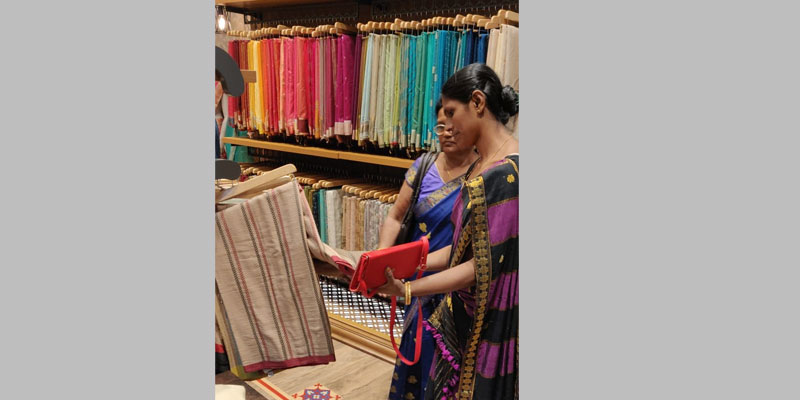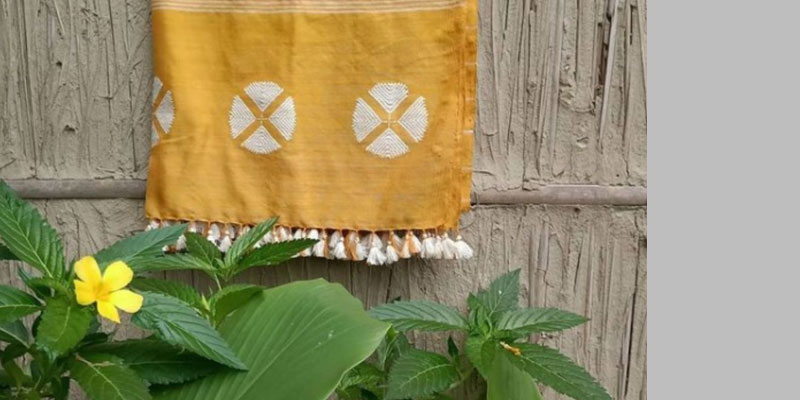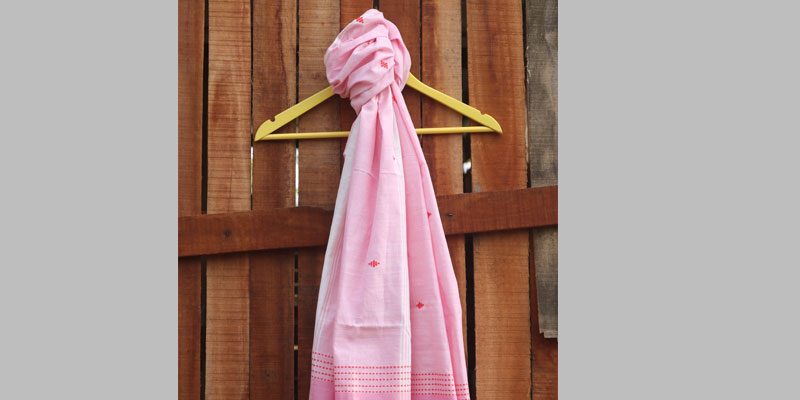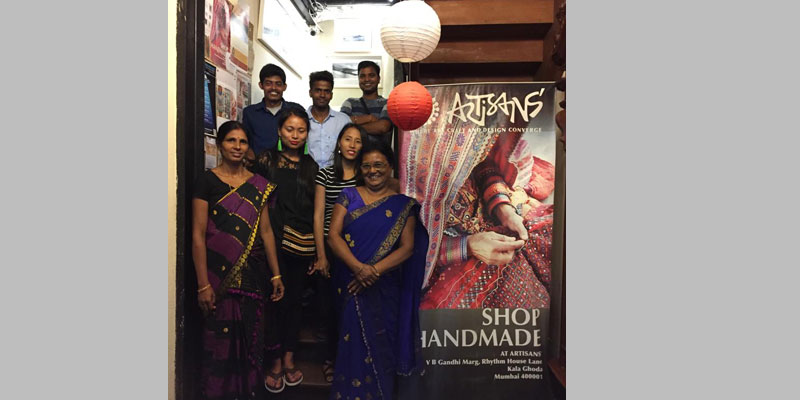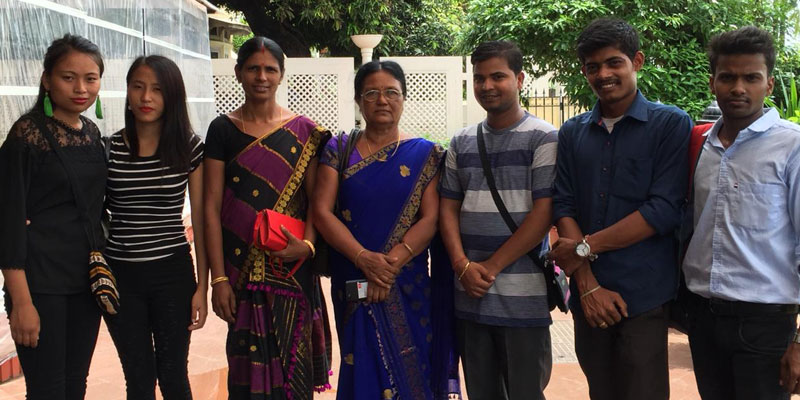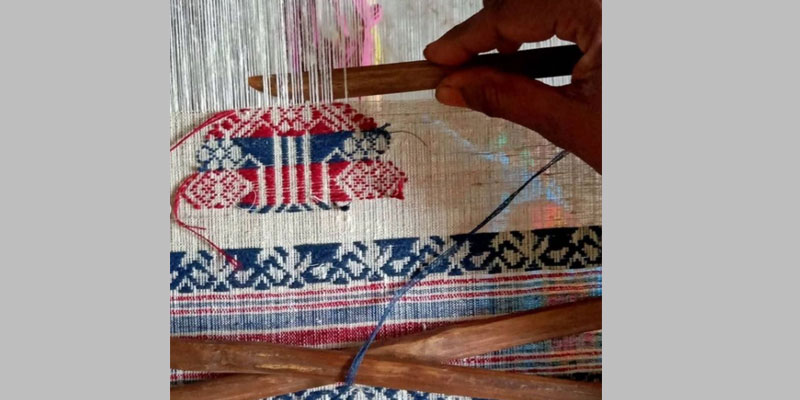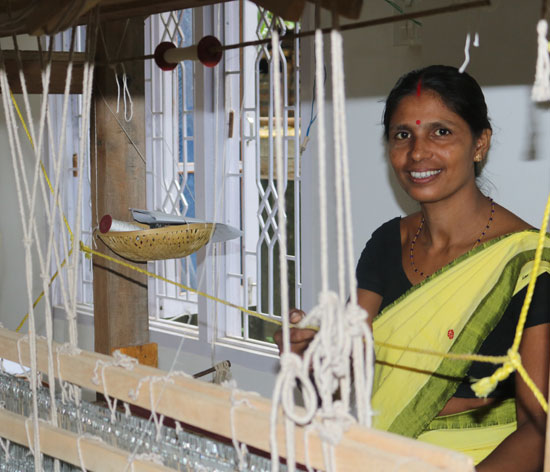
For Dipika Kakati , an artisan entrepreneur from a village near Kamrup, Assam, handloom is part of her legacy. “I learnt weaving for the first time when I was 8 years old and later inherited my mother’s handloom,” she says. Known as Dipika baidew, which translates to ‘elder sister’, she is a mother of two who devotes six hours of her day towards her handloom, while simultaneously juggling house chores. Her husband is a labourer in the village who also supports Ms Kakati’s crafts venture.
Ms Kakati runs a small self-sustained handloom business in Assam. As a traditional weaver, she would make gamosas (a typical Assamese stole) and other textiles for daily use. Today, Ms Kakati’s weaves have changed. She has taken up weaving naturally dyed sarees from eri silk and cotton and is bravely exploring new products as a handloom artisan. This change has taken place largely due to Tata Trusts’ Antaran initiative.
Launched by the Trusts in 2018, Antaran aims to support India’s traditional artisans in finding new markets and customers. The intervention plans to directly benefit 3,000 people involved in pre-loom, on-loom and post-loom processes, and thus, the livelihoods of thousands of craftspeople in the region. The intervention’s overarching objective is to create 300 entrepreneur-led enterprises and strengthen their craft ecosystem. This unique initiative also presents urban designers with an opportunity to collaborate with talented weavers from Assam, Odisha, Nagaland and Andhra Pradesh , thus opening up new opportunities for India’s handloom sector.
Growing with Antaran
Antaran provided a lifeline during Covid lockdowns. When the pandemic struck in 2020, it caused a heavy blow to many artisans in the state. Ms Kakati’s woes were intensified due to the rampant flooding in the region, which led to the loss of precious land owned by her. It was an initiative called Antaran Artisan Connect that helped her get orders for several stoles and dupattas, and which enabled her to earn an income through the lockdown and get the business back on track. Antaran Artisan Connect was set up during the pandemic to help artisans connect digitally with customers and buyers.
Explaining the difference, it has made to her life, she says, “For me, working on a handloom is like any other household activity. Earlier we made clothes for families or commercially for the Mahajans (local traders) or middlemen in the village who used to give us gave us bulk orders. After I joined Antaran’s intervention in October 2019, I started looking at it from the perspective of a small business. Eventually I started creating my own products for sale and began working with buyers. I am now experimenting with different styles and textile categories.”
The Trusts initiative has opened up new prospects for traditional weavers like Ms Kakati. “Since weaving for us has always been a home-based activity, most of the designs have been passed on to the family by our ancestors. We tend to work from memory. Either I’ve seen my mother make the designs or noticed other family members make it. Now however, I’ve started making new designs.” She draws inspiration from nature, such as a small leaf or a flower buta (pattern).
Ms Kakati learnt a lot a lot about developing her business, the way markets work, and even new weaving techniques during her classes at the Incubation and Design Centre as part of the Antaran Education Programme.
Here, artisans undergo a robust education where they learn about design and business, as empowerment towards entrepreneurship and self-employment. The Antaran team facilitates four-to-six month sessions which focus on nurturing young talent in the artisan communities. The training towards building sustainable micro enterprises ensures better income for artisans and their associates. The intent is that if artisans can become individual entrepreneurs and connect directly to markets, this will eliminate middlemen and make the craft more remunerative, while ensuring distributive justice across the value chain.
The road ahead
The Antaran connection helped Ms Kakati survive. She had worked with a few designers on their exclusive collections, and made some meaningful connections with her buyers. When one designer learnt about the flooding in her village, they supported her by sponsoring a new loom for her. This experience triggered the campaign on #GiftOfLoom, promoted by Antaran, where customers or buyers can help a weaver upgrade to a new loom. This campaign has since aided many artisans from the Kamrup region in receiving new looms from customers both across the country and overseas.
“The new loom has motivated me to work harder and assured me that my craft is of value in today’s market. I have not only expanded the range of products that I make, but have learned other aspects such as quality check, importance of measurement, colours, designing and using social media to get inputs from different buyers. All this has opened up a different world altogether. Now I get enquiries from Instagram, Facebook, Medium,” she says excitedly!
“A weaving culture can continue only if there are ample opportunities to earn a decent income. If people buy handmade textiles, it will surely help in preserving our culture and helping people understand the real value of the craft. I hope that Assam handloom becomes a common household name,” says Ms Kakati.
Through Antaran, she now supports seven associate artisans with work which helps them keep their looms running and earn a living. She also feels that the craft can survive only if the next generation takes the craft seriously. “I will myself start with teaching my own kids. I am building a small business today and my children will take it to greater heights. Today, I can proudly say that I am capable of creating something meaningful and nothing feels as fulfilling as that,” says Ms Kakati.
*Ms Kakati’s work can be seen at @ponihandlooms.
Connect with more artisan entrepreneurs like Ms Dipika Kakati, and help them grow their business
